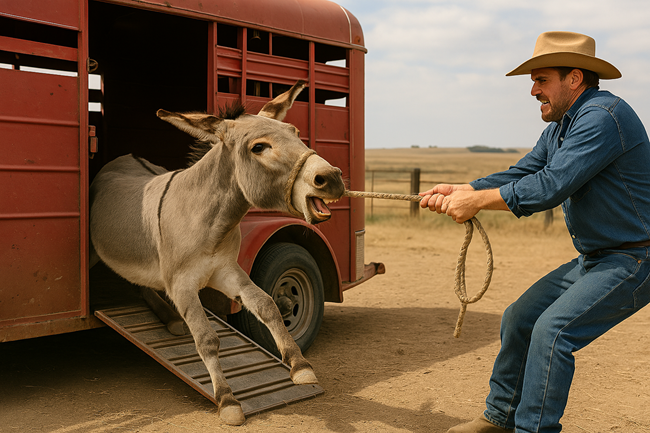Well, first off, never wait until the last minute to load a donkey. Trying to hurry them along often will make a donkey who does not want to be loaded into a trailer be at its worst. They’re just not into rushing. Most of the things that work for horses like butt ropes, haven’t worked well for us with the donkeys.

The best method we have found is to use a long lead rope that will reach to a secure ring toward the front of the trailer. Before we even ask the donkey to get into the trailer, we run the end of the lead rope up through this ring to enable one of us to keep the donkey from backing up when we do ask it to load. They are so strong that if they decide to back it’s just not possible to hold them without taking a wrap, or two, on something secure with the lead rope. This always works for us if the donkey is not allowed to back away at all. Some take more time than others to figure out they have no other options, but we’ve been able to load many donkeys this way with virtually no fussing.
Occasionally we’ll have one that will get its front in and then stand there as though it’s not possible to get their rear in. It’s important to take up the slack in the lead when they get to this point since most will opt to back out again. Keeping the tension on the lead so they have no easy way to go except in will usually persuade them to haul the rear up. This is usually the point where they will really test you if they’re going to and may fuss and try hard to back out. Don’t be alarmed, stay calm and try to act like nothing has changed, keeping the tension on the rope…not giving an inch. The worst thing we’ve ever had happen is that they may get their rear feet under the trailer a few inches while they are trying to dig in to pull back. I’ve not seen one ever take this to an extreme and injure themselves as a horse might. As soon as they feel the trailer against their leg they stop.
Whatever the method used, it is important for the handler to be calm and try to conceal whatever apprehension they have about the task at hand. Don’t look at the trailer like you’ve never seen it before but instead, try to move around it and the donkey in a very relaxed manner as you would if the two of you were going into the barn to do some grooming. Avoid opening dividers or doors like you’re afraid they’re going to fall off, so you won’t scare the donkey by making noises, etc. They will quickly sense your uneasiness and become suspicious of what’s in store for them.
As with any training we do with the donkeys, I don’t like to use food as a bribe for loading, but we do give them treats as a reward after they are secured in the trailer. Occasionally we do use food to coax a new donkey that doesn’t know us into the trailer if they’re food oriented. I wouldn’t do that with one that we have raised or that has been with us long enough to have learned to trust us. Patience is a much better tool that is always available no matter where we are. It also helps to have the trailer be as inviting as possible by putting shavings or hay down and cleaning out manure so there aren’t flies buzzing around in it. Be sure it’s as light as possible by turning on the interior lights, opening feeder doors and anything else that will increase the light. Open windows and vents well in advance of the time to load so the trailer isn’t like an oven on warm days.
Provided by Linda Coffman from Blue Mountain Farm.
Did You Know
Donkeys still have to have to drink water daily, but due to desert adaptations, their bodies do not waste or lose moisture as readily as does a horse. The donkey’s body extracts most of the moisture from their own feces and they don’t need to sweat as much as a horse would (donkeys don’t have the large muscle mass to always have to keep cool) causing them to be better water conservationists
A miniature donkey is not bred down from Standard Donkeys, but comes from the islands of Sicily and Sardinia. They were first brought to the US by Robert Green in 1929. However, it is no longer possible to bring these donkeys into the US from the Mediterranean Islands. This makes these sweet, little donkeys very limited in number in the US.
Related Articles & Free Email Newsletter Sign Up
6 Things to Avoid When Photographing a Horse That is For Sale
An Alpaca Can Be Both a Farm Animal and a Pet
Understanding the Unique Energy Needs of the Donkey




Comment here